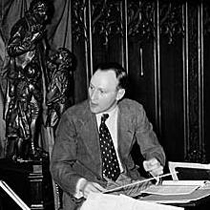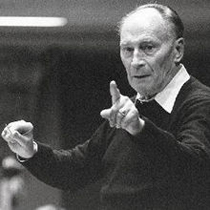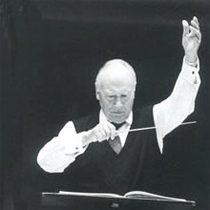Paul Sacher
Paul Sacher (1906–1999) devoted himself to the music of his century in many different ways: as a performer, as a patron of new compositions, and as a member and sponsor of many committees and institutions. As early as 1926 he assembled his first orchestra, the Basel Chamber Orchestra (Basler Kammerorchester, BKO), which remained in existence until 1987. This was followed in 1941 by the foundation of the Collegium Musicum Zurich (CMZ), which remained active until 1992. At first the programs of the BKO in particular were dominated by the contrast between early and modern music – a contrast considered novel in the early twentieth century. In later decades the repertoire expanded to include avant-garde currents from the latter half of the century.
One of Sacher's foremost concerns from the very outset was to commission new works for his orchestras. Besides composers from his private circle, such as Conrad Beck, Willy Burkhard, and Frank Martin, he soon established contact with such international figures as Béla Bartók, Igor Stravinsky, and Paul Hindemith. Later composers in his circle included Luciano Berio, Elliott Carter, Cristóbal Halffter, Hans Werner Henze, Heinz Holliger, and Wolfgang Rihm, to name only a few.
Occasionally the manuscripts of the works Sacher commissioned were given to him as a present. These manuscripts formed the cornerstone of what would later become the Paul Sacher Collection. In many cases his professional contacts turned into friendships, establishing the necessary basis of trust that encouraged the composers or their heirs to place entire collections of autograph documents at the Foundation's disposal. The initial impetus came in 1983, when Sacher acquired the Stravinsky estate on behalf of the Foundation. This purchase was followed a short while later by the Anton Webern and Bruno Maderna collections. The road was thus paved that would transform the Foundation into an international research archive.
Chronology
| 1906 | Paul Sacher is born in Basel on 28 April. |
| 1925 | He begins his studies in Basel with Karl Nef and Jacques Handschin (musicology) and Felix Weingartner (conducting). |
| 1926 | The Basel Chamber Orchestra (Basler Kammerorchester, BKO) is founded at Sacher's instigation. |
| 1927 | The BKO holds its first concert on 21 January, with works by Handel, Bach, Mozart, and the première of Rudolf Moser's Suite for Cello and Chamber Orchestra, op. 35. |
| 1928 | First concert of the Basel Chamber Chorus (Basler Kammerchor), founded by Sacher in June of that same year. |
| 1929 | First encounter with Béla Bartók. Sacher becomes a board member and artistic director of the Basel chapter of the International Society for Contemporary Music (ISCM). |
| 1931 | Sacher is appointed to the board of directors of the Swiss Association of Musicians. |
| 1933 | Sacher becomes director of the Schola Cantorum Basiliensis, a teaching and research institute for early music which he founded in Basel. |
| 1934 | Sacher marries Maja Hoffmann-Stehlin, the widow of Emanuel Hoffmann, who was in turn the son of the Basel industrialist Fritz Hoffmann-La Roche. |
| 1936 | Sacher commissions his first work from Béla Bartók: Music for Strings, Percussion, and Celesta. |
| 1937 | The BKO's «Tenth Anniversary Concert» on 21 January includes three world premières of newly commissioned works: Conrad Beck's Rhapsody, Willy Burkhard's Das ewige Brausen op. 46, and the above-mentioned Bartók work. |
| 1940 | Three commissioned works are premiered by the BKO on 11 June under Sacher's baton: Béla Bartók's Divertimento, Ernst Krenek's Symphonic Piece for String Orchestra op. 86, and Willy Burkhard's Genug ist nicht genug op. 53. |
| 1941 | Sacher becomes founder and artistic director of the Collegium Musicum Zurich (CMZ). |
| 1942 | World première of Arthur Honegger's Second Symphony with the CMZ on 18 May. |
| 1944 | First «serenade concert» with the CMZ at the Lucerne International Music Festival on 27 August. |
| 1946 | Sacher becomes president of the Swiss Association of Musicians. |
| 1947 | The BKO holds its Twentieth Anniversary Concert on 21 January with world premières of three commissioned works: Bohuslav Martinù's Toccata e due canzoni, Stravinsky's Concerto en ré, and Honegger's Fourth Symphony («Deliciae Basilienses»). |
| 1954 | The Schola Cantorum Basiliensis merges with the Conservatory and the School of Music to form the Basel Academy of Music. Sacher heads the new institute until his resignation in 1969. |
| 1955 | Sacher is appointed honorary president of the Swiss Association of Musicians. |
| 1960 | Sacher establishes a master class in composition at the Academy of Music and obtains Pierre Boulez as its teacher. |
| 1971 | Sacher joins the administrative board of IRCAM, founded by Pierre Boulez in Paris. |
| 1973 | Paul Sacher Stiftung established |
| 1983 | Igor Stravinsky estate acquired. |
| 1986 | The Stiftung officially opens with an exhibition on «Twentieth-Century Music at the Paul Sacher Stiftung» at the Basel Kunstmuseum. |
| 1987 | Final concert of the BKO and the Basel Chamber Chorus on 7-8 May. Both institutions disband after, respectively, 61 and 59 years under Sacher's leadership. |
| 1992 | Final subscription concert of the CMZ on 13 June, featuring the world première of Wolfgang Rihm's «Gesungene Zeit». |
| 1996 | The Paul Sacher Stiftung mounts a concert series, an international symposium, and an exhibition on «Classicist Modernism» at the Basel Kunstmuseum in honor of Sacher's ninetieth birthday. |
| 1999 | Paul Sacher dies in Basel on 26 May. |
A small documentary reader in German and English, entitled Paul Sacher in memoriam, was issued in 2000 as a supplement to the bulletin of the Stiftung (Mitteilungen der Paul Sacher Stiftung, no. 13; German/English brochure; out of print).


